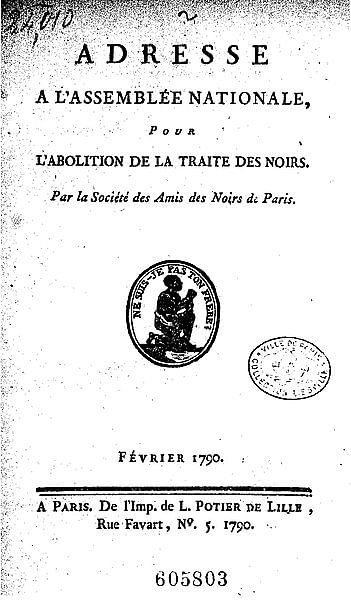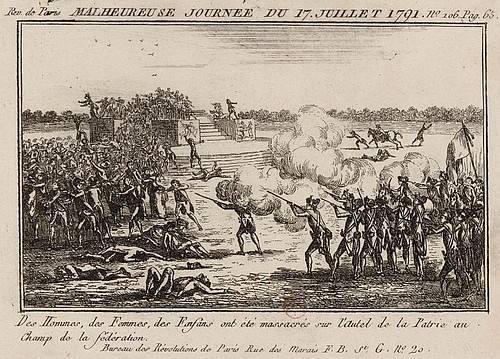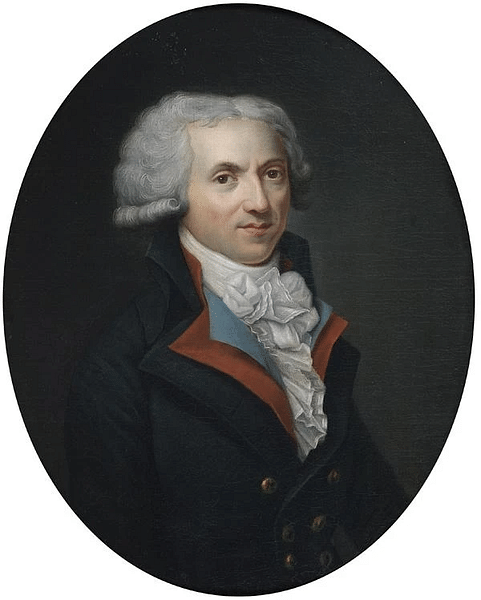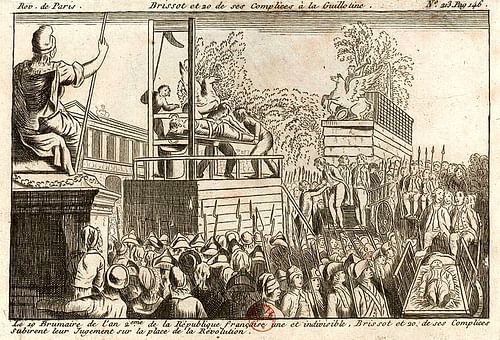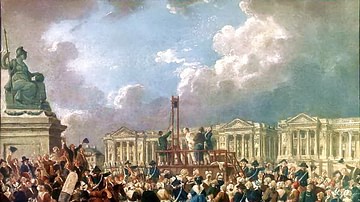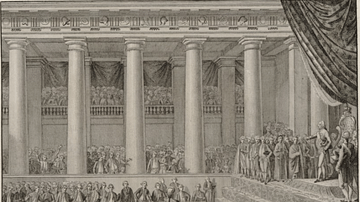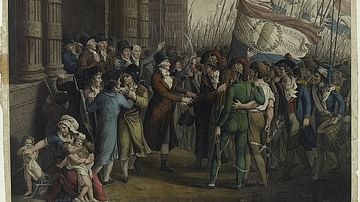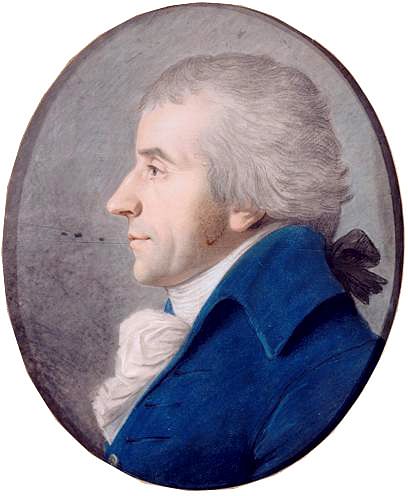
Jacques-Pierre Brissot de Warville (1754-1793) was a French journalist, abolitionist, and politician who played a prominent role in the French Revolution (1789-1799). A leader of the Girondins, a moderate political faction, Brissot was instrumental in embroiling France in the French Revolutionary Wars (1792-1802). He was also known for founding the Amis des Noirs, a French abolitionist society.
The son of an innkeeper, Brissot rose to prominence during the Revolution with his newspaper Le Patriote Français and won election to the Legislative Assembly in 1791. At a time when the Revolution appeared to be over, he did more than any other single individual in leading France into war with the rest of Europe, believing that France could solidify its revolutionary gains only through military conquest. He became the figurehead of the moderate Girondins, working with them to spare the life of King Louis XVI of France (r. 1774-1792) and to decentralize power from Paris; both projects ultimately failed. After the insurrection of 2 June 1793 led to the fall of the Girondins, Brissot was arrested. He was executed alongside 20 of his colleagues on 31 October 1793, victims of the Reign of Terror.
Early Life
Brissot was born on 15 January 1754 in Chartres, France, and was baptized with the name Jacques-Pierre the following day; his name is sometimes erroneously recorded as Jean-Pierre, a mistake that can be traced back to a 1793 attack pamphlet written by Camille Desmoulins. He was the 13th child in a family of 17, the son of an innkeeper. From an early age, Brissot demonstrated an extraordinary memory and a fondness for learning, leading his parents to send him off to the college at Chartres to be educated. During his studies, he became acquainted with the works of Enlightenment Age philosophers such as Voltaire and Jean-Jacques Rousseau and disillusioned with Christianity and with the state of France under the Ancien Régime.
Eventually, he decided to study law. In 1774, he left Chartres for Paris to pursue a legal career and found a job as a law clerk. Upon arriving in Paris, he added 'de Warville' to his name, after a small village where his father owned some land; he was later criticized for this, as it hinted at a desire for aristocratic distinctions. It was not long before Brissot tired of the legal world, offended by the injustices he witnessed within the French legal system. He abandoned his ambitions of becoming a lawyer in favor of a journalistic career; his first pamphlets, which criticized the legal system, did not pay well and he was forced to ask his mother to send him money. Later, his incessant lack of funds would force him to begrudgingly seek admission to the Paris bar, but this was denied due to his radical, anti-establishment pamphlets.
Pre-Revolutionary Journalism
On 17 September 1782, Brissot quietly married Félicité Dupont, a governess in the household of the Duke of Orléans. They kept their marriage a secret to avoid Félicité's association with Brissot's radicalism. Shortly thereafter, the couple moved to London. While living there, Brissot became acquainted with philosophers and writers such as Joseph Priestley and Jeremey Bentham. It was perhaps this association with famous thinkers that led him to co-found the newspaper Journal du Lycée de Londres, which was a planned collaboration of Europe's intellectuals to speak out against despotism everywhere. The project ultimately failed and put Brissot deeply into debt.
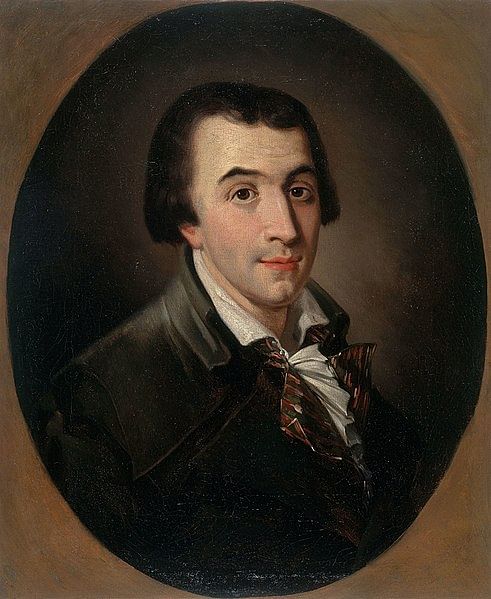
In London, Brissot continued writing pamphlets on the issues of the day, many of which were attacks on the French legal system. One of these works, Théorie des lois criminelles, was a plea for penal reform that criticized the use of the death penalty. Published in 1781, Brissot had apparently submitted a rough draft to Voltaire in 1778. The pamphlet was extremely controversial and was considered an attack on the government itself. As a result, Brissot was arrested upon his return to Paris in 1784 and was imprisoned in the Bastille. He languished there for four months until he was released, partly thanks to the efforts of his wife who appealed to her connections in the Duke of Orléans' household. Brissot did not seem to learn his lesson, as in 1785, he published an open letter to Joseph II, Holy Roman Emperor, in which he supported the rights of subjects to revolt against an unjust monarch. This letter again stirred up trouble, forcing Brissot to flee to London.
Abolitionism
During his second time in London, Brissot became acquainted with Thomas Clarkson, a prominent English abolitionist who sought an end to the slave trade in the British Empire. Clarkson invited Brissot to attend a meeting of the English Abolitionist Society, which made Brissot consider the impact colonialism and slavery had on his native France.
In the late 1780s, France's economy was still heavily reliant on its colonies, particularly the lucrative revenues from the sugar plantations in Saint-Domingue (Haiti), Guadeloupe, and Martinique. Located in the Caribbean, these colonies required a steady stream of African slaves to keep up with production needs; the abysmal conditions on these plantations led to extremely high mortality rates among their slaves. Slaves were also constantly in demand in the French colony of Louisiana. Consequently, the French slave trade was a monumentally profitable business, with some slave traders seeing profit percentages exceeding 100 percent.
Brissot, who had dedicated himself to the Enlightenment values of liberty and egalitarianism, was disgusted that the slave trade existed in his home country. Following Clarkson's example, he founded his own abolition club in February 1788, which became known as the Société des amis des Noirs ("Society of the Friends of the Blacks"). Brissot's club was more radical than its English counterpart, as it demanded the complete abolition of slavery rather than just the end of the slave trade. Membership in the club included prominent figures like Marquis de Condorcet, Comte de Mirabeau, and Étienne Clavière, all of whom aided Brissot in writing and distributing anti-slavery literature.
After the outbreak of the Revolution, members of the Society would take their message before the National Constituent Assembly, although they would often be shouted down by deputies who had financial interests in the slave trade. Antoine Barnave, chairman of the Committee on the Colonies, published a report advocating for the maintenance of the slave trade, leading Brissot to publicly denounce him. The Society would find support in the radical Jacobin Club, which was steadily growing in influence; the Jacobins would eventually abolish slavery in February 1794, but Brissot would not live to see it.
American Travels, & Patriote Français
In June 1788, after building a reputation as an anti-slavery lobbyist, Brissot journeyed to the United States. Landing in Boston, he marveled at the "simplicity, goodness, and dignity of men which is the possession of those who realize their liberty" (Schama, 583). Brissot visited American abolitionists but also sought audiences with prominent members of the American constitutional convention to gain a better understanding of the young republic. In early 1789, he was elected as a foreign honorary member of the American Academy of Arts and Sciences, and he even considered permanently moving to the United States with his family, which now included three children.
He was in Philadelphia in May 1789 when the French Revolution began. Hurrying back to Paris, Brissot founded a revolutionary newspaper entitled Le Patriote Français which he edited from 1789 to 1793. The paper was one of the most successful to be printed in Paris during the Revolution, despite its relatively dry prose. Through his newspaper, Brissot became a respected revolutionary authority and exerted enormous influence. In an October 1790 issue, Le Patriote Français published a lengthy letter arguing that the hair of patriots should be kept short, straight, and unpowdered: "this coiffure is the only one which is suited to republicans: being simple, economical, and requiring little time, it is carefree and so assures the independence of a person; it bears witness to a mind given to reflection, courageous enough to defy fashion" (Schama, 525). The paper's influence was such that this patriotic hairstyle was soon in vogue.
While Brissot had always leaned toward republicanism, he announced his support for establishing a French Republic in July 1791, after King Louis XVI tried and failed to flee France and instigate counter-revolution in the Flight to Varennes. Brissot appeared before the Jacobin Club, where he had become known for his oration, and attacked the idea that the king was inviolable and above prosecution. Brissot worked alongside fellow journalist Camille Desmoulins (1760-1794) and revolutionary leader Georges Danton (1759-1794) to draft a petition calling for the king's deposition and for a public referendum to be held on whether the monarchy should continue. When 50,000 demonstrators gathered to sign the petition on 17 July, they were fired upon by National Guards in the Champ de Mars Massacre.
Leader of the 'War Party'
Two months after the massacre, the National Constituent Assembly finally adopted a constitution, and France became a constitutional monarchy. Brissot was one of the 745 men elected to the new government, the Legislative Assembly. By now, he was a well-known and popular figure, and quickly became one of the most influential voices in this new assembly. Initially, he sided with the radical Jacobins who shared many of his beliefs regarding democracy and abolition. However, it was not long before he and his supporters broke with the other Jacobins over the issue of war.
Since the outbreak of the Revolution, tensions had been brewing with France's neighbors, many of whom felt threatened by the increasingly extreme rhetoric of the revolutionaries. In August 1791, Austria and Prussia issued the Declaration of Pillnitz, a joint statement that threatened Revolutionary France with military invasion should any harm come to the French king and queen. While the declaration was comprised of empty threats, Brissot took it as a challenge and began to lobby support for a preemptive war.
On 14 October 1791, Brissot gave a speech to the Assembly in which he sketched out a vast European conspiracy to destroy French power forever. France's old enemy Austria was at the head of this plot and must be destroyed before it succeeded in its goal. He proclaimed that the nations of Europe, enslaved by tyrants, would never allow a liberated nation like France to exist; to secure the gains of the Revolution, the French must embark on a 'universal crusade' to carry the Revolution beyond its borders and into the corners of Europe. Only through military victory and conquest would the despots be forced to accept this new order of liberty, equality, and fraternity. "I tell you," Brissot concluded, "that you must avenge your glory or condemn yourselves to eternal dishonor" (Schama, 593).
Brissot's speech was well-received and applauded by deputies from across the political spectrum. In the coming months, his call to arms would be echoed by likeminded deputies who were referred to first as Brissotins, and then more commonly as Girondins, since many of them hailed from the Gironde department in southwestern France. Not quite a political party in the modern sense, the Girondins were a loose coalition of ideologically similar deputies, many of them vibrant speakers who won over the votes of undecided deputies with their fiery rhetoric. Prominent Girondins included Pierre Vergniaud, Madame Roland, and Jérôme Pétion, although Brissot was regarded as their figurehead and unofficial leader.
In late 1791 and early 1792, the Girondins, who at this point had become the pro-war party, received enough support that they were able to dominate the Legislative Assembly, with Brissot himself in charge of the vital Diplomatic Committee. Not everyone agreed with them, however; Maximilien Robespierre (1758-1794), the rising star in the Jacobin Club, believed that war would bring an end to the Revolution. Robespierre argued that war could easily lead to the destruction of France at the hands of its enemies or the rise of military dictatorship from within.
Robespierre and Brissot frequently spoke against one another in the Jacobin Club, as their disagreement quickly devolved into a bitter, personal hatred. This hatred was mirrored in their respective factions; the Jacobins who opposed the Girondins formed their own faction, called the Mountain. Yet the Mountain was not powerful enough to stop the Girondins, who were riding high on war fervor. France declared war on Austria on 20 April 1792, beginning 23 years of nearly uninterrupted warfare.
The Gironde vs the Mountain
The declaration of war only exacerbated the hatred between the Girondins and the Mountain, a rivalry that would lead into the dark days of the Terror. Initial French defeats in the War of the First Coalition (1792-1797) saw a Prussian army begin to advance toward Paris; fear of attack radicalized many Parisians, leading to such hysterical slaughters as the September Massacres of 1792. Brissot was blamed for the situation, and his life was narrowly saved by Georges Danton who resisted calls for his imprisonment.
Brissot and his friends had meant to check the growing radicalism of the Revolution, but after the summer of 1792, found they were too late. The monarchy was toppled and a Republic was declared, as the extremist Mountain faction grew in power. In October 1792, Brissot and other Girondins were expelled from the Jacobin Club. This hardly mattered as Brissot had created his own power base and still enjoyed much support from within the new provisional government, the National Convention. As French armies conquered Belgium at the end of 1792, Brissot urged for the expansion of the war and successfully convinced the Convention to declare war on Great Britain and the Dutch Republic in February 1793. He incorrectly predicted that British sans-culottes were on the verge of rebelling, thereby turning the French Revolution into a global one. "We shall not be calmed," he declared, "until Europe, all Europe, is in flames!" (Doyle, 201)
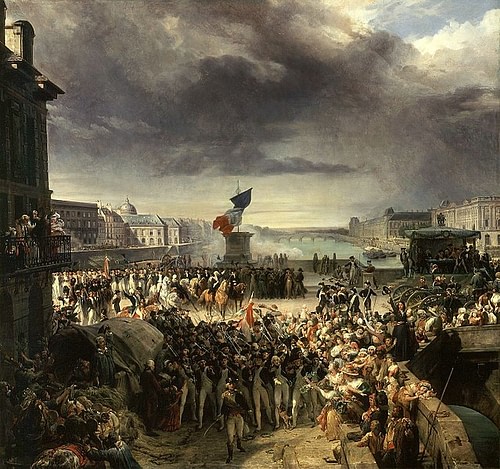
As Brissot predicted grand military triumphs, at home the Girondins were losing ground to the Mountain. In late 1792, the Girondins had argued bitterly with the Mountain about the fate of the deposed king. While the Mountain wanted to execute him without trial, the Girondins hoped to spare his life. Brissot argued that killing him would deprive France of a valuable bargaining chip with its enemies. He proposed instead a referendum should be held so all of France could decide Louis' fate. In the end, a trial was held, and the king was guillotined; the trial and execution of Louis XVI showed the diminishing of the Girondins' influence.
The Gironde and the Mountain's next bitter dispute was over the concept of 'federalism', referring to the centralization of power in Paris compared to the dispersal of power throughout the entire country. The Mountain, whose power base rested with the lower-class sans-culottes of Paris believed that what was best for the capital was best for the nation. The Girondins, who mostly came from the provinces, believed that the mobs of Paris were excluding the rest of the nation from having a say in national politics. The spring of 1793 saw this debate become more vitriolic, as the Girondins accused the Mountain of dictatorship, and the Mountain accused the Girondins of wanting to fragment the nation.
Downfall & Execution
Around this time, the war had again turned against France. The Battle of Neerwinden on 18 March 1793 had seen a decisive French defeat, leading the Austrians to reclaim Belgium. Only weeks later, Girondin-aligned French General Charles-François Dumouriez defected to the Austrian side. April and May saw increased attacks on Girondins by radical Mountain journalists. Girondins were accused of being foreign agents who started the war to destroy France and who advocated for federalism to splinter the republic. Desmoulins released a particularly brutal condemnation against Brissot personally, entitled Brissot Unmasked, in which he alleged that Brissot had once been a police spy for the Ancien Régime. Brissot denied this, but the claims permanently stained his reputation.
It was only a matter of time before the mobs of Paris got involved. Many Parisians truly believed that the Girondins were against them and so set out in great numbers for the National Convention on 2 June 1793, demanding the arrests of 22 leading Girondins. 80,000 Parisians and National Guards surrounded the Tuileries Palace; when François Hanriot, commander of the National Guard, threatened to blow down the door with his cannons, the Convention caved, ordering the arrests of the Girondins. The fall of the Girondins from the Convention led to the dominance of the Mountain and the period of the Terror.
Brissot and his allies were placed under house arrest. Many escaped Paris, traveling to the pro-Girondist department of Normandy, from where they began to incite the federalist revolts against Jacobin rule. Brissot himself was one of the first Girondins to escape his imprisonment in Paris. He set off for Caen, Normandy, but was detained in his hometown of Chartres where he was caught traveling with forged papers. Sent back to Paris, Brissot was tried alongside 21 of his fellow Girondins in October 1793 before the Revolutionary Tribunal.
By now, the Terror was in full swing, and the trial of the Girondins was purely for show; no documents were submitted into evidence, and no lawyers were afforded to the accused, who were not even allowed to speak in their own defense. On 30 October 1793, the Girondins were found guilty and sentenced to death. The next day, they were packed in a tumbril and hauled off to the guillotine, defiantly singing La Marseillaise as they went. Brissot was executed alongside his friends, aged 39. They were buried side by side in the Madeleine Cemetery.

